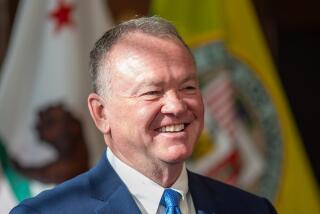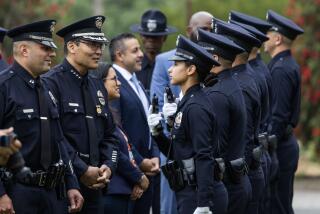Bradley Seeks $14 Million to Hire 400 More Officers
Continuing a three-year campaign to put more police on Los Angeles streets, Mayor Tom Bradley announced Tuesday that he will seek $14.5 million in the city’s new budget to hire 400 additional officers.
The proposed hires would bring the authorized strength of the Los Angeles Police Department to a record 8,814 officers--almost 2,000 more than five years ago.
Calling crime fighting “our No. 1 priority in this city,” Bradley said the latest expansion is feasible despite budget pressures and uncertainty about the source of the funding. Some of the money, he said, will come from assets seized from drug dealers.
The new officers will be used “to increase uniformed police presence on the streets,” LAPD spokesman Cmdr. William Booth said after the mayor’s announcement.
During a time of increasing attention to the problems of gangs and drugs, police officials have been given the go-ahead to hire more than 500 new officers in each of the last two fiscal years. In proposing a somewhat smaller expansion in fiscal 1990-91, Bradley cited the tight budget and noted that police recruiters are “having a hard time just staying abreast” of previously approved expansions while trying to replace retiring officers.
“I think this is a realistic figure,” he said.
Bradley, who served for 21 years on the Los Angeles police force before retiring in 1961, said Police Chief Daryl F. Gates has “ultimate authority” over use of the additional officers. But “we’re not just focusing on drugs and gangs,” he said.
The mayor said that some of the money may be used for increased foot patrols throughout the city. He also praised the department for using “innovative” crime-fighting approaches such as bicycle patrols.
“It doesn’t matter what community we are talking about. . . . People want to see the visibility of the Police Department,” said Councilman Richard Alatorre, who joined Bradley and Councilman Zev Yaroslavsky in announcing the expansion proposal. “Whether it’s perception or reality, people do not feel safe.”
Yaroslavsky, chairman of the council’s Finance Committee, said he still hopes to find an additional $4.5 million in the next budget to meet the goal he announced in January, 1989, of adding 525 new officers a year so that the department can crack the 10,000 barrier by 1993.
“If the money is available . . . and if the department can assure us they can train 500 new officers . . . that is where we ought to go,” Yaroslavsky said.
“The Police Department has been so overtaxed, so overworked, they have been unable to respond in a timely fashion to people’s emergency calls,” he said.
The LAPD currently has about 8,100 officers, 314 short of the number authorized for the fiscal year ending June 30.
Cmdr. Booth said the department is “close to being on target” of reaching authorized strength by that date.
“Then we will start working on the 400,” he said, estimating that--when natural attrition is considered as well--a total of 650 to 700 officers will have to be recruited and trained during the next fiscal year.
“We think it’s a goal we will be able to meet,” he said.
Bradley said part of the idea of announcing the police expansion early, before formal budget deliberations, was to “help them in their recruiting.”
But the mayor cautioned that a larger Police Department does not necessarily mean reduced crime.
“The size of the department obviously is an element. . . . You just cannot make that guarantee,” he said.
BACKGROUND
The Los Angeles Police Department reached a then-record strength of 7,514 officers in 1975. The number began dropping, however, partly because of the financial pinch put on local governments in the wake of Proposition 13. The LAPD hit a modern low of 6,635 officers in early 1981, and had an authorized strength of just 6,900 as recently as the 1984-85 fiscal year. Although new hires have been approved every year since then, police officials complained in 1988 that Los Angeles’ rate of 2.35 officers for every 1,000 residents was just half that of Detroit. New York, Philadelphia and Chicago all had at least 50% more officers than Los Angeles when measured against population.
More to Read
Sign up for Essential California
The most important California stories and recommendations in your inbox every morning.
You may occasionally receive promotional content from the Los Angeles Times.










